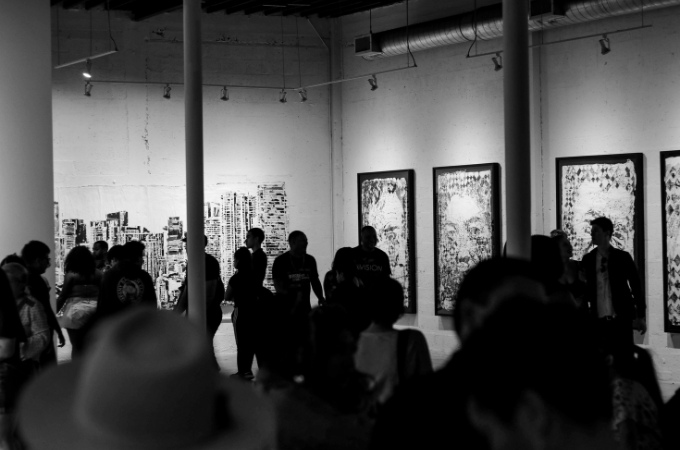
Nii Tetteh always loved art. He especially loved art which was subversive and deeply unsettling. To him, art was the language of wisdom – it was a means to re-imagine the world anew. Art was not just a thing of beauty but something that conveyed the true meaning of life, perhaps the secret to existence itself. But above all, the art which moved his soul was the timeless art, which spoke to the frailty of the human condition.
Chief amongst these were artistic interventions which sought to bring humanity to what Fanon had called “the wretched of the Earth.” For if there was any word which Nii Tetteh would ultimately use to describe himself lately it was that, wretched. Whereas his girlfriend, the incomparable Nandi, was one word and one word alone, beautiful. How could one who was beautiful reside with one who was wretched? Surely such contradiction only worked out in romcoms. Real life was surely far more brutal in its pragmatism. But even so, he hoped that bringing her here might stir something up in her. He hoped that it might make what he needed – or was it wanted? – to tell her, that much more palatable. It might make it easier to digest.
TY Nkosi was a queer artist who had made waves on the international art scene for their fierce depictions of queer Africans in ways which made them seem regal, elegant and powerful. Nii Tetteh had accidently stumbled upon Nkosi’s work on his Instagram feed. He had hoped that in Nkosi’s upcoming exhibition, We Are Not Yet Queer, he may find the perfect place to utter ‘the words’ to Nandi.
The gallery was choc-full of Joburg hipsters: a man dressed in full agbada with circular Harry Potteresque lenses, a girl with blonde dreadlocks and a couple in matching white dungarees with obnoxiously large black Balenciaga’s edging out. The DJ played a blend of the latest Afrobeats and amapiano tracks, as waiters handed out trays of canapés and champagne flutes. The gallery was bursting with that youthful possibility that defined the pulse of Johannesburg: a multi-racial class of cool kids hoping to imagine their beloved Mzansi anew. But how ‘new’ was the new South Africa? And was Nandi ready for how admittedly modern Nii Tetteh was about to make their relationship?
“Why are you so quiet babe?” said Nandi as she gave his hand a gentle squeeze. Then she looked directly at him. It had already been a year, but his heart still skipped a beat when she gazed directly into his eyes. Whether it was because he hoped she would not see the shame which so tormented him or whether it was because her beauty was a taste which could never be acquired – for it was that formidable – he did not know.
“Babe, you know when you look at me that intensely I get naughty thoughts,” he said beaming.
Nandi laughed then said, “C’mon tell me what you were thinking before I looked at you. I know you’re such a geek when it comes to art, like when you said that garden shovel – which you told me was a piece of Dada – allegedly meant something.”
“I was just pulling your leg, babe. That really was just a shovel,” said Nii Tetteh with a smirk.
Nii Tetteh fixed his gaze on a work titled, “Mwanga II, Long May He Reign.” The magnificent portrait consisted of striking colours which made the last king of Buganda appear simultaneously majestic yet fierce. Nii Tetteh overheard a pair of friends nearby chatting about the artwork, “Can you believe that today people think it is unAfrican to be gay or bisexual? Uganda has just passed one of the most homophobic laws on Earth, when one of their greatest ancestors was openly bisexual. As far as I am concerned, it was just a mischievous colonial conspiracy to concoct the rumour that he had those Christian ‘martyrs’ killed because they rejected his advances. The real reason he had them murdered was because they were a bunch of pathetic imphimphi. You know like Samuel L. Jackson’s character in Django Unchained,” the man said. His friend howled in laughter. Then they clinked their glasses and said in unison, “To Mwanga, and our other great queer ancestors, qawe lamaqawe.” It was only a split second, but Nii Tetteh swore he saw Mwanga II wink at him as the pair clinked their glasses, as if egging him on.
“So, what is it you wanted to say, s’thandwa sam?” Nandi said to him. “Did you want to say, ‘my what a handsome man this is!’” she chuckled softly.
“No, not that, babe. I wanted to say it’s brave, this whole exhibition is–”
“Brave? I don’t think it’s that much of a big deal,” said Nandi unequivocally.
“Well, just look that way and you’ll get what I mean,” said Nii Tetteh as he pointed to the portrait behind her. Nandi turned around and saw a huge portrait. It was at least half a metre tall. Simply titled “Inkosi yethu,” it was a portrait of two muscular men in full Zulu warrior regalia. An isihlangu lay at their feet as they embraced each other in a kiss. Nandi came upon the inscription. She only read “Shaka Zulu is depicted here embracing one of his lovers,” when she dropped her champagne flute as it shattered into what seemed like a thousand tiny shards. Nii Tetteh meanwhile felt like his heart had been the one that had been shattered into a thousand tiny pieces. How deep is our love? He thought to himself as the iconic Bee Gees song played in his head on a loop.
***
The day Nandi made her advances on Nii Tetteh, he wanted to utter the words, “but I am Nii Tetteh, just Nii Tetteh,” to mimic Harry’s iconic statement upon learning that he was the boy who lived. But instead, Nii Tetteh attempted to come across as cool and confident so he simply said, “I would love to.” Their first date was at the Melville Koppies on a Sunday morning. The friendly elderly white volunteers beamed at them as they completed their forms at the entrance. Nii Tetteh thought to himself, why are they so sabe?* But that thought was soon replaced with, they must think I am lucky to be with her, Nandi.
Nandi was a woman of rare beauty. Rumour had it that she had shot down numerous requests for her to compete in Miss South Africa. Nii Tetteh was relieved she didn’t take up the offer because then Nandi might have fallen into the trap of being reduced to her beauty alone. For Nandi was much more than a sight to behold. She was also very thoughtful and attentive. The latter quality was both a blessing and a curse because she often asked him the question, “What’s wrong?” or “Are you okay, babe?” The first time she dropped the word ‘babe’ Nii Tetteh would have gone as red as a bottle of All Gold had it not been for his dark cocoa complexion. He simultaneously found relief and admiration in her forthrightness and defiance of gender norms, as from the get-go Nandi had made pretty much every move. He wanted to ask her, why. She of all people had no need to. On top of that was the even more pressing question, why me?
When they reached the summit of Melville Koppies, they took a seat at a bench and sat in complete silence. At first Nii Tetteh was mostly catching his breath, but then the silence began to feel heavy and awkward. So, that’s when he began to speak about himself. When he was done, Nandi said, “You know you don’t talk much but when you do, you seem extra sexy,” then she planted a kiss on his cheek. That’s what gave Nii Tetteh the courage to hold her hand. She placed her head on his shoulder as they gazed upon the Johannesburg skyline. What would she do if I told her about that which may not be named, which he likened to a Voldemort buried deep within him? But that thought was quickly replaced with, Dude, the headline is: all is well. So, as the cool kids say: Keep calm and carry on.
***
Nandi was just standing in front of the beautiful yet provocative painting with her face agape. The artist had used dozens of soft brush strokes in a rich diversity of shades to make the image of the two men embracing stand out behind a pallet of soft pink in the background.
“S’thandwa sam, urayiti?” Nii Tetteh asked her.
“I am not,” she muttered softly, it came out like a whisper. “Why did you bring me here?” her eyes spoke of dissatisfaction and intense suspicion.
“Remember how you said South Africans always act like things always have to be black or white, both literally and figuratively, so maybe we just need to do what you called, ‘embracing the grey’?”
“Yeah, but what does that have to do with anything?”
Nii Tetteh wanted to speak but his tongue felt held back somehow. He took a deep breath then continued, “Well, maybe that’s what I am: grey. I mean to say, I occupy a liminal space, a space in between extremes, I both am and am not.”
“Now is not the time for riddles, could you get to the point please?” she hissed.
“Babe, I am–”
“You’re what? Not breaking up with me surely?!” now her eyes spoke of indignation and a quiet rage.
“Babe, I am bi. I am bisexual.”
“You’re what?” she asked, aghast.
“I am attracted to both women and–”
“I have heard that word before. It’s one of those silly newfangled expressions. Let me tell you something. There’s no such a thing as a man who is ‘bisexual’. What you are is gay. Why not just be man enough to say it? Instead of talking all this rubbish,” as she clicked her tongue.
Nii Tetteh couldn’t conceal the hurt which lay bare in his bloodshot eyes. “I thought you might say that. Babe, you’re not listening.”
“No, I am listening. I can hear you loud and clear. You don’t want me. Maybe you never did. At best you’ll want to keep me while you fool around with some guy on the side.”
“Babe, that’s not what I am say−” Nii Tetteh said as he tried to grab her hand.
“Ngiyeke!”
“Nandi,” he said softly feeling slightly lightheaded.
The glass shards still surrounded her. A cleaner emerged with a mop, broom and dustpan and cleaned up the mess. The corrosive silence between them could occupy an entire room.
***
The first time Nii Tetteh introduced Nandi to his parents, his mother’s whole face shone as if he could read her mind: I am finally going to have a grandchild oh! He was not entirely sure what made Nandi so endearing to his Ghanaian parents. After all, they were the same ones who often spoke disapprovingly of the so-called ‘uncouth tendencies’ of their fellow Black compatriots. Or perhaps it was because it had simply been so long since Nii Tetteh had brought home a girlfriend that they had abandoned their prejudices and replaced them with a radical pragmatism. Or maybe it was how when Nandi showed up, she had her hair done in a cute afro and wore a necklace made of cowrie shells. She had also – perhaps deliberately – chosen a skirt made of Akwadushao** print to wear. And oh, how Nii Tetteh’s mum loved cowrie shells, and Akwadushao was her favourite print! Or maybe it was how Nandi took such a quick liking to his mother’s signature jollof accompanied by a plate of bite-sized kele wele. It was only Nii Tetteh’s close childhood friends who ate his mother’s food with such enthusiasm and glee.
Naturally, Nii Tetteh wanted his parents to like Nandi, but he did not want them to regard her merely as a means to an end. A means to disprove a long-held suspicion that perhaps their beloved son was something unmentionable.
***
Nandi took off her shoes and started to trot out of the gallery barefoot as Nii Tetteh cried out to her, “You know what? It’s your loss not mine. All this time I felt all this shame. I replayed this moment over and over again, wondering how I could make this land well, but I can see now that I was placing too much value in you and too little value in myself.”
Nandi stopped abruptly, turned around and said, “So, you want to put this on me?”
“All I am saying is I can see now that I am enough. And actually, it is you, not me.”
Nii Tetteh began to feel lightheaded as his eyes met those of Mwanga II in the rich painting. As he did, a swirl of diverse colours encircled him. Suddenly, Mwanga II became animated like the talking paintings in Hogwarts. Nii Tetteh rubbed his eyes in shock. “My son, you are not wretched. Men like you and I have always existed. I have done my bit. Now it’s your turn to keep the torch burning. It’s time to re-imagine the world anew.”
Nii Tetteh looked to his left and to his right. Everyone was still milling about as if nothing had happened, drinking their champagne, and chatting softly. As he marvelled at the magnificent paintings surrounding him and thought of Nandi, he remembered what his grandmother always used to say to him.
Sho ni ye fo. All that glitters is not gold.
*A Ga expression for an unnecessarily nosy person.
**Akwadushao translates to a ‘bunch of bananas’.
Photo by Ruben Ramirez on Unsplash










COMMENTS -
Reader Interactions